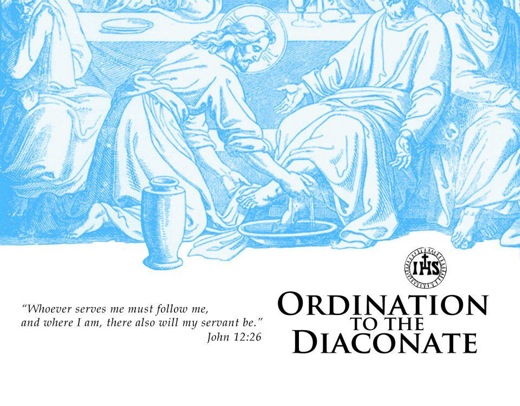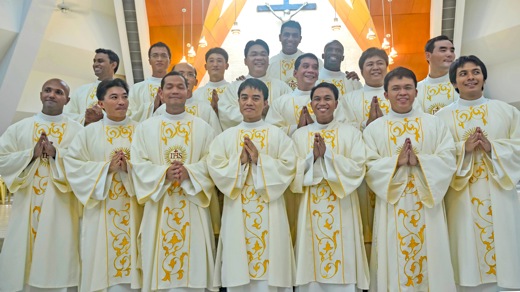Seventeen Jesuit scholastics were ordained deacon in Manila on September 8. They were an international group from nine Provinces and Regions in three Conferences, Asia Pacific, South Asia and Africa. Six of the new deacons are from the Philippine Province and the other 11 from Arrupe International Residence (AIR).
“The ordination to the diaconate marks a threshold in their formation since with this, they become members of the “clergy” technically speaking, and that, at least 6 months from this, God willing, they will become priests, finally,” said Fr Renato Repole SJ, Rector of AIR.
“Diakonia is Greek for service and as deacons, they are meant to serve in various ways – baptize, proclaim the Gospel, preach homilies, etc. In more technical terms, the deacon performs a three-fold ministry: Ministry of Worship, Ministry of the Word, Ministry of Service.”
The newly ordained deacons are:
China: Paul Zhai
Eastern Africa: Eric Simiyu Wanyonyi
Indonesia: Bernadus Dirgaprimawan
Korea: Dong II Andrew Kim
Malaysia-Singapore: Mark Aloysius, Sebastian Koh Siong Yong, Alvin Frederick Ng Sze Syn
Myanmar: Wilbert Mireh
Philippines: Gil Donayre, Arthur Nebrao Jr, Francisco Parilla, Joseph Raymund Sanchez, John Lester Tajon, and Chester Yacub
Sri Lanka: Sanjeeva Fernando, Thushara Sampath
Thailand: Sigit Setyo Wibowo
At dinner a few days before their diaconal ordination, Fr Bill McGarry SJ gave them “six bits of advice”.

2. Please don’t rejoice that studies are over. I hope that they never will be over for you. Too many priests short-change their parishioners by not keeping up to date or not trying to get deeper and deeper into the Word of God. Some bore the faithful almost to tears. Read books and articles? Yes. But most importantly use your ears more that your mouth and learn from people, especially the poor but also everybody, even dithery old men. I believe that praxis/reflection is the best book you can read. You try to change yourself or apostolic situations and then reflect on what you learned from that praxis. Never skip the Examen. Of course, the best way to do praxis/reflection is to do it with others, your fellow Jesuits, your partners in the apostolate. Do it with others. I suspect that this practice would eliminate the need of many sabbaticals. You learn on the job.
3. Multi-tasking except in very moderate forms is a synonym for superficiality or inferior service. Father General is begging us for depth, the enemy of superficiality. Sometimes rather heavy multi-tasking becomes a temporary necessity. But it should always be temporary unless we want superficiality or inferior service to become a policy. No time for prayer, study, reflection, serious conversation with the brethren, rest? If this ever happens, drop something, like TV, Face Book, surfing, or ask your superior for relief. These things we say we have no time for cannot be dropped responsibly. We’re called to depth in our lives and work.
4. Our much-loved church (That means us.) tends lately to be quite expert in communicating bad news, I hope you Deacons will become expert at communicating good news. Want to help the world and the church? Be a witness to the resurrection. We are sent to bring good news, THE Good News. Take care of your emotional health. You can’t communicate the good news with a glum face. Pray to be cheerful.
5. When I was one-and-twenty I heard a wise man say, ‘Give crowns and pounds and guineas but not your heart away… But I was one-and-twenty; no use to talk to me. …I heard him say again, ‘The heart out of the bosom was never given in vain. ‘Tis paid with sighs a plenty and sold for endless rue. And I am two-and-twenty and oh ‘tis true, ‘tis true.” Excessively pessimistic? I think so. Too selfish? I think so. However if you with your celibate chastity want to be happy and avoid endless rue, I ask you to try not to fall in love. “’Tis paid with rue, maybe not endless but tends to bring great sadness. A.E. Housman wrote that poem and he seems to have been selfishly self-protective. Hold on to your hearts but don’t spend your life in cold self-protection. Love people. Mix with people. Be their friend. But hold on to your heart not for the sake of protection from liebesschmertz, but in order that you may warmly love and serve many and with a joyful face.
6. I strongly recommend Karl Rahner, Der Glaube des Priestes Heute, Orientierung 1962, Translated in Woodstock Letters with the title, “The Faith of the Priest Today”. This has turned out to be something like a charter for priesthood for me. It really talks about the depth we’ve mentioned above. It talks about walking with and learning from and with the people of the world of today. It repeats what Father Arrupe said about choosing tough over soft ministries. It agrees with the mission given to the Society by Paul VI to combat Atheism. It led the 32nd General Congregation to tell us clearly that our mission today is the Service of Faith and that Promotion of Justice which Faith includes. It is another reason for serious study. It asks us to face the fact that secularism and agnosticism are on the rise in all of our countries. We need to see that we Jesuits are not called just to repeat what other church people are doing no matter how wonderful these apostolates are. We should do what others don’t do for whatever reason. I think we are called to many kinds of people but I judge that the highest priority is to the poor, those allergic to the church, to agnostics. Yes, always the poor but also in the words of Father Rahner, “It is by entering into the world of today, and being with men in their difficulties, their anxieties, their doubts, that we can bring this world to faith, and not by posing as somehow different….Our faith must be such that even the unbeliever cannot deny that here a man believes who is like himself, a man of today, on whose lips the word God does not come easily or cheaply, who doesn’t think he has mastered everything, and in spite of all this, rather because of all this, he believes.” A hard challenge but we can only do our best with the talents we have. At least no canonizations of saving the saved, superficial multi-tasking, only the majus servitium.
The diaconal ordination was held at the Church of the Gesù in Ateneo de Manila University. The Most Reverend Leopoldo C Jaucian, SVD, the Bishop of Abra in the Province of Bangued in Northern Philippines presided.
After his ordination, Wilfred Mireh SJ said, “I am grateful to God who has called us to this Jesuit vocation and I am grateful to the people who have supported us in various ways,” he said. Wilbert is the first Myanmar Jesuit to reach this stage of formation.







